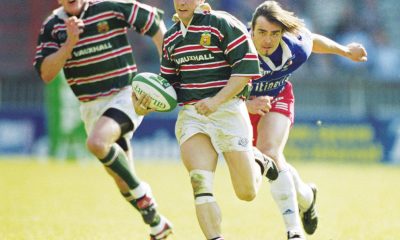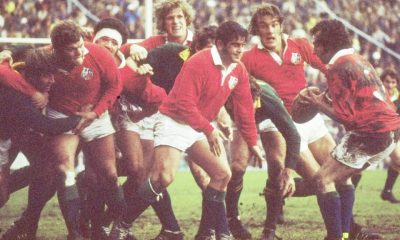 Jonny Wilkinson’s career has spanned 15 years and 367 matches, a tribute as much as anything to his indomitable spirit. His appearances in Wales have been surprisingly few and far between, unusually so even allowing for the three lost seasons during his mid-twenties when all those tackles began taking a savage physical toll.
Jonny Wilkinson’s career has spanned 15 years and 367 matches, a tribute as much as anything to his indomitable spirit. His appearances in Wales have been surprisingly few and far between, unusually so even allowing for the three lost seasons during his mid-twenties when all those tackles began taking a savage physical toll.
That only goes some way towards explaining why the sport’s supreme professional has played just six competitive matches in Wales, an average of one every 30 months. At that rate, today’s European Cup tie for Toulon against Cardiff Blues at the Arms Park will be his last on this side of Offa’s Dyke.
Whatever happens during the remainder of his playing days, today’s return to Welsh soil will be very different to his first European visit on December 11, 1999 for a Shield tie against one of those little clubs that gloried in defying the odds during those chaotic early years of professionalism.
The then 20-year-old Wilkinson made the long haul from Tyneside to Swansea with a Newcastle Falcons team already reliant on his prodigious goalkicking. The opposition wasn’t Swansea but a little club in one of the city’s western suburbs.
Dunvant may have long resigned themselves never to playing in Europe again but back then they were members of the Welsh Premiership, punching way above their weight but aware that theirs was a fairytale which simply could not last. With typical precision, Wilkinson ensured that Dunvant’s European campaign would not survive the return in Newcastle the following week.
He kicked nine goals (seven penalties, two conversions) as Dunvant went down gallantly, 45-26. The attendance, reported as 400, suggested that the event had done rather less than grab the imagination of the sporting public of south-west Wales.
David Vaughan, an after-dinner speaker of renown whose service to Dunvant man and boy spanned 40 years as chairman and president, begs to differ. “There would have been at least a thousand there that day because those were exciting times for the club,” he says. “I can’t be sure because it was so long ago but I do remember having a chat with Jonny in the lounge afterwards.
“I don’t recall what we talked about. Most probably, I’d have had a few by then but you could say he certainly made an impression. His goals made the difference between the teams that day and his visit has not been forgotten.
“We never thought we would reach the heights of playing a big English team in a European competition. In the ensuing years, a lot of our members have not been slow to tell visitors from other clubs: ‘JonnyWilkinson played here…’ ‘”
Dunvant, now in the Second Division West of the Welsh League, are proud to describe themselves as a community club where their players play for the love of the game and nothing else. They did win something the day they played Newcastle as current president Dorian Samuel recalls.
“Newcastle brought a bus load of supporters down and we put on quite a concert for them,” he says. “Sir John Hall had bought the club and changed the culture and some of the old customs fell away. When they were Gosforth in the amateur days, they used to present an award to the most hospitable club of the season.
“The fans had such a good time when they were here that they decided to resurrect that award and present it to us. The plaque has had pride of place on the clubhouse wall ever since and that’s a very nice reminder of the day Jonny Wilkinson came to our club.”
Wilkinson may have appeared in almost 100 Tests for England and the Lions but the most famous player of his generation never got round to setting foot on Cardiff Arms Park. He would have done so before the turn of the century had its demolition to make way for the Millennium Stadium not forced Wales to switch their home match against England to Wembley.
Wilkinson kicked everything on a day when Scott Gibbs danced into history and Wales ambushed the English Grand Slam. In having to settle for the truncated club version of the Arms Park this afternoon, he will be wary lest his fancied Toulon trip over the losing Blues the way England tripped over Wales on that blessed sunny Sunday 13 years ago.
The fortunes of the respective clubs have changed since their last meeting, in the Amlin Cup final at Marseilles in May 2010 when Toulon were cruising until Wilkinson got injured and Cardiff came from behind to win in some style. Since then the Blues have regressed, initially because of their refusal to buy a match-winning stand-off like James Hook from the Ospreys.
While they made do with pale imitations (Sam Norton-Knight and Dan Parks), Toulon’s policy to reach for the stars has been in sharp contrast to Cardiff’s under Peter Thomas.
Thomas’ French counterpart, Mourad Boudjellal, has kept pushing the boat further and further out into the Mediterranean, collecting all manner of internationals, many ageing, from all over the rugby world.
After reaching last year’s domestic final, Toulon’s aim to conquer France and Europe could be achieved simultaneously this season. Their revered English fly-half has won everything there is to win except the European Cup – a glorious chance, therefore, for the Blues to upset the odds and avoid a fourth straight defeat.

2 Comments
You must be logged in to post a comment Login
Leave a Reply
Cancel reply
Leave a Reply
You must be logged in to post a comment.

Latest News
Bordeaux accused of Pollock vendetta

Latest News
Lamb support for Champ changes

Latest News
GB to cut its sevens project

Latest News
Call for concussion protocols to be revised
























Pingback: tire shop near me open now
Pingback: trustbet